J.R.R. Tolkien's creation of Elvish languages wasn't merely a linguistic exercise; it was a crucial element in shaping the very essence of Middle-earth and its compelling narratives. The beauty and depth of Elvish quotes, whether spoken by majestic elves or whispered in ancient lore, significantly contribute to the immersive and emotional power of his stories. This exploration delves into the art of storytelling as enhanced by Tolkien's meticulously crafted languages, focusing on how Elvish quotes elevate the narrative and resonate deeply with readers.
Why are Elvish Quotes so Powerful?
The power of Elvish quotes stems from several factors: their inherent musicality, the sense of history and ancient wisdom they evoke, and their ability to convey emotions beyond the limitations of common speech. Tolkien invested years in developing these languages, imbuing them with grammatical structures and phonetic qualities that reflect the elven culture and character. This linguistic intricacy translates into quotes that feel both alien and deeply moving, adding layers of depth and meaning to the narrative. They aren't just words; they're glimpses into a rich, imagined world.
What Makes Elvish Languages Unique in Storytelling?
Unlike many fictional languages created for fantasy settings, Tolkien's Elvish languages possess a remarkable level of internal consistency and complexity. He didn't simply invent a few phrases; he developed fully functioning grammatical systems, vocabularies, and even historical evolutions. This dedication to linguistic realism allows for a level of nuance and authenticity unseen in most fantasy literature. Elvish quotes, therefore, aren't mere decorations; they are integral parts of the narrative fabric, conveying subtle information about character, history, and setting.
How Do Elvish Quotes Enhance the Emotional Impact of the Story?
The emotional impact of Elvish quotes is undeniable. Phrases like "Aiya Eärendil Elenion" (Hail Eärendil, brightest of stars!), uttered with reverence and hope, carry far more weight than a simple English equivalent. The inherent musicality of the language, combined with the context in which it's spoken, amplifies the emotional resonance. The language itself becomes a character, a powerful tool for expressing the grief, joy, and determination of the elves. The mystical quality of the language adds to the sense of wonder and awe that permeates Tolkien's world.
What are some famous Elvish quotes and their meanings?
Many readers are familiar with "Elen síla lúmenn' omentielvo," which translates roughly to "Starlight, star-light, shining on the water." The beauty of the original Elvish phrase, however, transcends any translation. The subtle nuances of the language, the evocative imagery, and the melancholy tone all contribute to its lasting impact. Other examples include phrases used in songs or blessings, each carrying a unique cultural significance and emotional weight within the context of the story. The meaning and impact are often further enhanced by the melody and the way it is sung.
How did Tolkien's knowledge of languages influence his Elvish creations?
Tolkien's deep understanding of linguistics, particularly his expertise in ancient languages like Finnish and Welsh, significantly influenced his Elvish creations. His linguistic knowledge allowed him to craft languages that felt both authentic and fantastical, possessing the internal consistency and depth that make them so captivating. He approached language creation with the same meticulous attention to detail that he brought to every aspect of his world-building, resulting in languages as rich and complex as any real-world language.
Are there different dialects or variations within Elvish?
Yes, Tolkien created several distinct Elvish languages, each with its own unique characteristics and history. Quenya, for example, is a more formal and ancient tongue, while Sindarin is more commonly used in everyday conversation. These linguistic variations add another layer of depth to his world, reflecting the diversity of Elven cultures and their historical evolution. The subtle differences in vocabulary and grammar between these dialects further enrich the storytelling experience, allowing for a greater sense of realism and immersion.
How do Elvish quotes contribute to the overall world-building in Tolkien's works?
Elvish quotes aren't just linguistic flourishes; they are fundamental elements of Tolkien's world-building. They contribute to the sense of history, providing glimpses into the elves' rich cultural heritage, beliefs, and traditions. The language itself reflects the elven worldview, their values, and their relationship with the natural world. By using Elvish, Tolkien not only created a sense of authenticity but also deepened the reader's understanding of the elves as a distinct and captivating people. It's a testament to Tolkien's commitment to creating a truly immersive and believable fantasy world.
In conclusion, the skillful use of Elvish quotes is not simply an aesthetic choice but a cornerstone of Tolkien's artistic mastery. Their impact extends far beyond simple decoration; they enrich the narrative, enhance the emotional depth, and contribute significantly to the overall world-building, leaving an indelible mark on the reader's imagination. They stand as a testament to the power of language to transport readers to other worlds and resonate deeply within their hearts.
